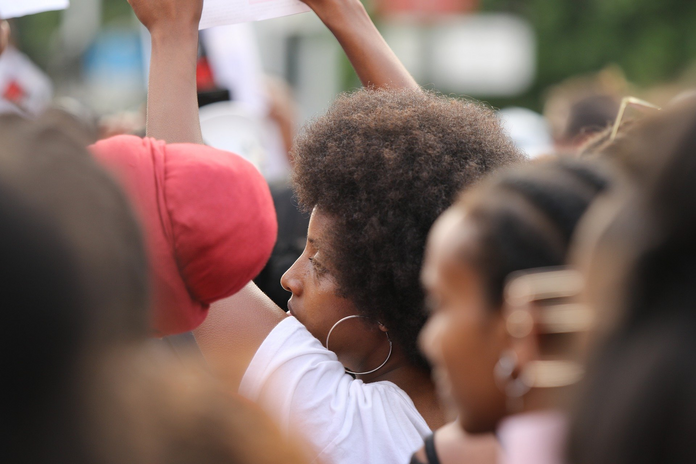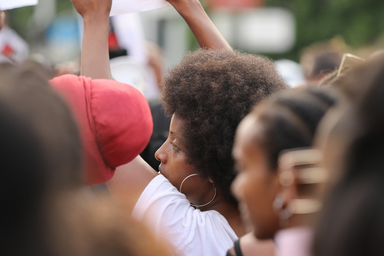In late May of 2020, the continuation of the Black Lives Matter movement shifted with the murders of George Floyd, Breonna Taylor, Tony McDade and more innocent Black lives by the hands of the police. With this, there have been persistent calls for defunding the police, accountability towards higher powers and deconstructing bystander culture for the purpose of abolishing functioning systems of injustice against Black people in the United States.
Our current climate signifies the importance of understanding we all have a responsibility to listen, to respond and to actively engage in ways that dismantle systems and institutions of oppression. But what are we witnessing during these times? It is no secret historically racist structures influence behaviors, which lead to white supremacy. The superiority complex is built on the belief that people of color are “inferior” to white people. Yet, it is denser than this inference. White supremacy builds itself on the culture of silence coincided with violence, policy, and inaction, which enables the continuation of racism, in examples such as mass incarceration, Black mortality rates, the school-to-prison pipeline, redlining and gerrymandering, etc.

There is no question that the resurgence of the Black Lives Matter movement is amplifying the voices who were excluded from the conversation. Those voices are constantly reminded by this country that they will always be considered as “less-than.”
However, the question is, how are you going to be a part of dismantling systems and institutions which survive and thrive off of injustice? Are you willing to confront your own anti-Blackness? In order to consider deconstructing these frameworks, you must evaluate the ways in which you have enabled these behaviors, sentiments and actions to be a part of some of the greatest atrocities committed by this country. Bigotry can be intersected; therefore, it is important to realize that when “Black Lives Matter” is said, it means all Black Lives. Transgender Black women are not exempt from this equation. This is a tough conversation to have about analyzing how you aid in oppression. For true change and progression to lead the way, this process must begin. Here are five considerations to implement into your anti-Racist framework.
1. Reflect on how your bias and privilege aids in the stigmas around race.
Before we speak of systems and institutions, we must begin at the basic level of where accountability should be fostered: the individual. In our homes, schools, churches and the very people we surround ourselves with, there are anti-Black remarks, actions and complicity. With silence and in your encouragement of those remarks, as well as your inability to understand the problematic nature of those behaviors, it represents the privilege you obtain. With privilege, it functions as an enabling factor that thrives off of being willingly ignorant, giving into excuses, and ignoring an intersectional framework because the problems that those of the Black community face are ones that you can not identify with in a personal manner. It must be understood the importance of how you became comfortable in anti-Blackness. Your actions have consequences, which is indicative of where you stand on those issues.
Be active. While it is not easy, engage in dialogues with your family members and people within your friend circles. If you have been relying on anti-Black leaders, textbooks and ideologies, you have to dissect those perspectives and unlearn such behaviors and thoughts. This will not be an overnight process; however, each day you should devote yourself to understanding which aspects of your life have encouraged you to be actively racist and persistently find ways to give back, to educate yourself and to call out individuals whenever you notice those behaviors. You can not expect to be for social justice if you apply favoritism and narcissism against accountability and correction. Keep in mind that you are never too pretentious to be checked. This climate demands internal and external reflection translating into growth and continuous change.

Related: 4 Years After Colin Kaepernick’s First Protest for Racial Justice, Athletes’ Voices are Louder than Ever.
2. Use the tools within your disposal to begin your journey in inclusive education.
During this time, many resources have been provided to the public in order for people to educate themselves about anti-Blackness and how to be of better service to the community. It is best to use all of what is at your disposal. For instance, director Ava Duvernay with Netflix made her documentary 13th free for viewing purposes on Youtube. The documentary is about the loopholes within the Thirteen Amendment which aid in mass incarceration, which disproportionately affects Black people. There are other documentaries, films, articles, and book clubs that are dedicating their practices towards inclusive education and open floors for the public to reflect on the current climate of this country. As far as podcasts are concerned, 1619 by The New York Times and Code Switch created by NPR, center additional perspectives about learning sociological and historical aspects of the United States, while providing thought-provoking commentary.
Education is not easy. There will be times where you feel defeated or not willing to do the work.
However, to put it simply, the movement requires a passion and a dedication to be active and fight against poor attempts of doing the bare minimum. Read books and commentary by Black writers, while also exploring the powerful medium of cinema where Black directors use their platforms for sparking dialogues and change about the injustices which continue to fester. Some suggestions for Black creatives to study (but not all) would include Ava Duvernay, Spike Lee, Matthew A. Cherry, Melina Matsoukas, Janet Mock and John Singleton. Educate yourself in a way that encompasses all platforms. Your goal is to ensure that you are listening to the times and dedicating effort into understanding how you have privilege and the ways you give into the racial hierarchy. Engage with an open mind.

3. Understand the true definition of allyship.
The word, “ally” has been used tremendously over the past six months. But, what are you doing with it? Are you engaging in performative activism or sincerely considering how to be of service? Performative activism is the public persona displayed in order for others to negate their roles in racism or any form of bigotry.
For instance, the Black squares solidarity push on social media and the Instagram stories filled with “Black Lives Matter” are prominent examples of performative activism. In this practice or with words, there is no substance behind what you are claiming to stand for. You have to keep the same energy maintained on social media with people in your family and friend spheres. Simply taking five seconds to share an Instagram story is not activism.
Yes, we are aware that Black Lives Matter, but how is your activism expanding beyond the phrase? You have to examine your behaviors and connect your change with action, thus bringing it full circle. An ally is someone who understands the importance of not being silent and supports marginalized communities. Allyship is not posting every action you commit to for self-validation or approval from your peers. It is not about jumping on the bandwagon with your friends. There is a consistent continuation of murder, oppression and trauma against the Black community. We are not fine opportunities for your pleasure or validation. If you do not stand for truly being an ally and addressing your bias, this movement is not for you.

Via ArtisticOperations on Pixabay
Related: The Issue and Hypocrisy of Using Racism as Entertainment
4. Know when it is your time to take space versus stepping back with listening.
It must be understood that we all have privilege. One of the key tips of keeping it in check is realizing that not every conversation is destined for your opinions. There is no debate when it concerns someone’s humanity and human rights. Let it also be known that there are many things you can learn by listening to others and their experiences. Not everyone will share the same perspective, but it is essential to validate those backgrounds and be open-minded about their journey, while still respecting it. Sorry, this is not the time to disclose how “outraged” you are about racism. This is a continuous cycle that has been thriving for over four centuries. It may be new to you, it is not for us. Instead of saying you’re upset by it, use your actions and voice instead to hold the powers that be accountable. Moreover, understand the times where it is best for you to… listen.
You may find similarities in someone else’s experience; it is not yours. When someone engages in the verbal and emotional labor to educate you about something, understand the honor you should feel in that, listen to their concerns and own up to your mistakes if you speak out of turn. Not every discussion requires someone with privilege lamenting about how “bad” 2020 is as a year. Not every discussion needs you giving into guilt and performative outrage about issues that have not directly affected you in comparison to people within those communities. You will learn much more when you are not taking up space in that regard. When a person from a marginalized group comes forward with their encounters and experiences, you must aid in fostering a safe space. One that is open, respectful and understanding about what they have to face in society. Just because those backgrounds may be new to you, it does not negate their reality.

5. Your parting message: fight.
Becoming an active ally is a process that requires an earnest amount of sincerity and dedication. This is definitely not for the faint-hearted. These tips are designed to pose to the question of whether or not you’re willing to do the work.
It is important to note that there will be times where you fail, where you say the wrong thing, and times where you are insensitive. The goal is to take accountability and grow from those circumstances. Coinciding growth with corrected, changed behavior is a positive start. Also, consider that when it is thought of dismantling anti-Blackness that such a process is not just for cisgender heterosexual and able-bolded Black folks. It is for all of us across the diaspora, in the LGBTQIA+ community, those with mental health conditions, differing economic backgrounds, skin tones, religions and ideologies.
Our liberation is one that should center all of us with respect to the different challenges we have to face. Your process of growing, learning and evolving should never stop when the coverage of Black Lives Matter is no longer “trendy.” Your activism should not stop when it is no longer gaining the traction you expected. Using your platforms should not stop when you are not getting the number of likes you’d hope for. The climate calls for individuals who are ready to break down the traditional molds of society that encourage unjust systems and institutions. As Congressman John Lewis stated, we must make “good trouble.”
When you fight, make sure that it is endless, impassioned by the multitude of voices and future leaders who are paving the way for true equity, justice and liberation. The time is now.



